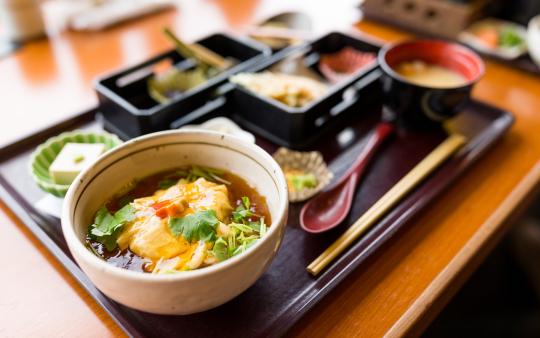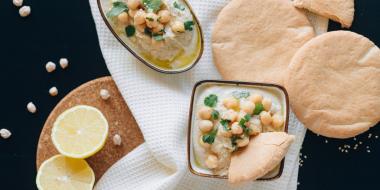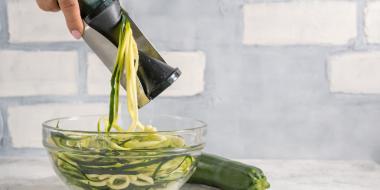We’ve partnered with Eden Foods to inspire you to eat well and maintain a healthy lifestyle during these challenging times.
According to the World Health Organization, Japan has the highest average life expectancy and the greatest proportion of centenarians worldwide. Researchers attribute this primarily to their diet, which consists of lean and balanced foods low in saturated fats and sugars, and rich in vitamins, minerals, probiotics and omega-3s – all of which help reduce the risk of obesity, cancers and heart disease. In addition to diet, researchers have also found their philosophy on personal purpose and meaningful life to have a significant impact on their health. Let’s take a closer look at how the Japanese take a holistic approach to eating habits and how you can incorporate their dietary and lifestyle practices for greater health and longevity.
Ikigai: finding your purpose
In North America, we wear our busy lives like a badge of honour. In Japan, slowing down to meditate, drink tea, and focus on eating a meal is valued and essential for cultivating inner peace and a sense of ikigai - a Japanese term meaning “a reason for being.” This philosophy rests at the heart of the Japanese way of life. Finding one’s ikigai is less a mystery than a conscious pursuit of psychological well-being and putting purpose into action. We can find purpose when one’s passion, mission, vocation and profession converge. To find your ikigai, ask yourself the following questions: What do I love? What am I good at? What does the world need? And, what can I be paid for?
Finding these answers can lead to an enlightening and exciting process of self-discovery. Studies have shown that ikigai reduces anxiety, increases resiliency and self-understanding and is associated with longevity. There is a robust association between one’s sense of purpose in life/ikigai and overall well-being.
The Okinawan Diet
Researchers have tried to uncover the secrets to longevity by studying the residents of the Japanese island of Okinawa - one of the 7 "Blue Zones" and proportionally low risk of age-related diseases. They found that in addition to living with ikigai, diet was also an essential factor. But we’re not talking about dieting trends or fads. Okinawa residents ate a traditional, balanced diet of whole foods (usually sourced locally) that are low in fat and calories but high in dietary fiber and dense in nutrients, including essential vitamins, antioxidants, and minerals. Their staples consist of whole grains, green and yellow vegetables, fruits, soybean-based foods (such as tofu), sea vegetables, and fermented foods (such as miso and natto), with smaller quantities of meat and fish. In short, if you want to have more energy and live longer - eat like an Okinawan!
Include: Whole Foods, plant-based proteins, high fiber, low-glycemic carbs (such as soy products, beans and legumes).
Restrict: refined sugars, alcohol, highly processed foods, saturated fats.
Practice Mindful Eating
We can learn from these centenarians that we should strive to be present and practice mindfulness in all things, including having an intentional relationship with food. It’s not just about what you eat, but how. Did you know it takes at least 20 minutes for the brain to recognize you’re full? Incorporate the guiding principle of “Hara Hachi Bu,” a Confucian teaching that means to eat until you are about 80% full. This can help prevent over-eating and teach you to become more in tune with your body. Beyond the obvious discomfort and excessive calories that may contribute to weight gain, overeating also puts stress on the body by forcing the digestive system to work harder to process the food, which increases oxidative stress, which can cause chronic inflammation. This leads to all sorts of health problems and accelerates the ageing process.
Manage emotional or stress eating
It may come as a surprise given our social prevalence to comfort eating, but people need to be relaxed to break down food and absorb nutrients properly. You can manage stress eating by eating mindfully and choosing filling and nutritious foods. One thing you can try to help manage stress eating is the cultivation of gratitude and a healthy relationship to food. Stress and exhaustion can make temporary energy-boosting foods such as sugar or caffeine appealing, but they can worsen symptoms. Try a more nourishing, energy-boosting beverage such as green tea or Matcha. In Japan, green tea has long been valued as a traditional drink for its health and therapeutic properties, but Matcha has an even higher concentration of antioxidants.
We recommend Eden Foods Organic Matcha finest grade, hand-harvested, stone-ground green tea powder from Japan. A cup of Matcha contains half the caffeine of coffee, is loaded with antioxidants, and imparts a sense of mental clarity, emotional balance, and physical well-being.
Eating and Living with Purpose
If you’re feeling inspired to find your ikigai, eat mindfully, and start incorporating traditional Japanese foods into your diet for greater health and longevity, we recommend starting with the Eden Foods specialty line of Japanese foods. Eden sources directly from artisans in Japan who are dedicated to traditional food making practices. They carry everything from miso and soy sauces, to sea vegetables, condiments, and more. For family-pleasing favourites such as the Soba Noodle Bowl Recipe below, we recommend stocking up on Eden’s Udon and Soba noodles.
With health at the top of everyone’s minds, there has never been a better time to focus on eating and living well. As we have learned from the centenarians of Japan, you’re never too old or too young to cultivate a healthy and meaningful life.
You may also enjoy: Soba Noodle Bowl Recipe, The Macrobiotic Diet for Beginners and the Benefits of Matcha, Plus how to Find the Healthiest Kind.

Founded in 1968, Eden Foods is the oldest principled independent organic food company in the United States. Its mission is Creation and Maintenance of Purity in Food. Eden brand is the authentic alternative to commercial food; the purest, best tasting grains, beans, and vegetables on the planet, from known trusted growers. Healthy soil, long-term organic, non-GMO.







